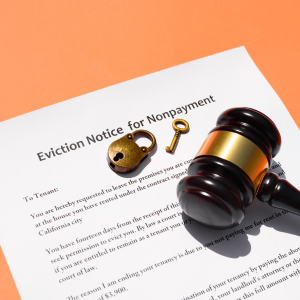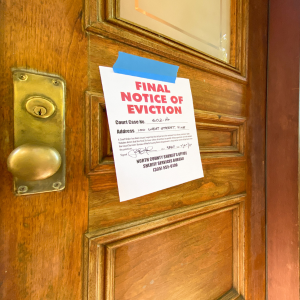
Evictions in Chicago, IL, follow specific legal steps that affect timing. A Team Real Estate Solutions helps tenants and landlords understand the process and plan accordingly.
Understanding the Eviction Process in Chicago, IL
In Chicago, IL, the process of evicting a renter or landlord can be hard to understand and navigate. With more rules and strict adherence to legal processes, it’s important for landlords to fully understand each step to make sure they follow the law and avoid delays. To do this, you need to know the most common reasons for eviction, which are usually related to rental agreements, and the time limits set by Illinois law. By understanding these basic points, owners can better handle the complicated eviction process in Cook County and improve their chances of a smooth prosecution.
Common Reasons for Eviction
There are several things that might lead to an eviction, all of which show how important the landlord-tenant relationship is. A common reason is when tenants don’t pay their rent, which means they don’t follow the terms of the contract. In this situation, landlords often use the eviction process to get back control of the property. Another common reason is breaking the conditions of the lease, which can include a lot of things, like subletting without permission, damaging the property beyond normal wear and tear, or doing illegal things on the property. Tenants in Chicago can also be evicted if they keep bothering other people, which can lead to a nuisance charge that can make the community’s living conditions very bad.
In Illinois, especially Cook County, landlords need to be very careful and follow the law from the start, beginning with giving the right notice of lease termination. The landlord must provide a notice that clearly states why the lease is ending and gives the renter a chance to fix the problem if they can. This notice is a formal document that helps the landlord’s case in court during the eviction hearing. Following this first step is very important because any mistake could make the eviction process take much longer, which would be bad for the timeline. If each protocol is followed correctly, landlords can move on to the next steps quickly, making sure that the eviction follows Illinois law.
Keeping detailed records of all tenant contacts and lease infractions might help landlords avoid the many problems that come up during evictions. This paperwork is very important in any legal case because it strengthens the landlord’s case. Also, talking openly with renters before evicting them may lead to other solutions or settlements that make eviction unnecessary. This proactive strategy can help tenants keep their homes and keep their relationships strong if they are willing to change their behavior. Landlords can better handle the eviction process if they know these reasons and strategies. This will reduce stress and interruptions.
Evictions often result from late rent, lease violations, property damage, or illegal activity. If you’re looking to sell your home for cash in Chicago and other areas, we offer a fast and practical solution.
Overview of the Illinois Eviction Timeline
In Illinois, the eviction timeline is meticulously organized by state law to promote equity for both landlords and tenants amid disputes. The journey typically starts with the landlord issuing an eviction notice, a necessary legal step to notify tenants about the end of their lease and the possibility of needing to leave the premises. Common types of notices consist of a five-day notice for unpaid rent and a ten-day notice for violations of the lease agreement. It’s crucial to recognize that these notices serve as warnings, not eviction orders, and they mark the beginning of the legal process.
After the notice period has expired without any resolution, landlords have the option to initiate an eviction case in court. In Cook County, the process of obtaining a court date can fluctuate, but it generally takes place within a few weeks. Throughout this period, the court will inform the tenant about the ongoing proceedings, and they have the option to challenge the eviction. Getting ready for this phase is essential for property owners, as the court mandates proof of the landlord’s assertions, which encompasses any notices issued and lease contracts. Insufficient preparation can lead to prolonged court decisions for landlords, potentially lengthening the eviction process considerably.
The eviction hearing provides an opportunity for both parties to present their arguments, leading to a decision from the court. If the court decides in favor of the landlord, a judgment will be issued, enabling the landlord to seek an order of possession. This procedure requires working together with the sheriff’s department to carry out the eviction, which in Cook County may extend over several more days before it is finalized. This enforcement completes the eviction process, legally and definitively reinstating the landlord’s property rights.
Landlords must focus on keeping up-to-date with legal obligations and any updates in Illinois housing regulations to effectively manage this intricate process. Taking the time to grasp these regulations not only guarantees adherence but can also streamline the eviction process when needed. In the end, understanding the intricacies of property management is essential for landlords in Chicago who want to navigate the strict regulations surrounding eviction in Illinois successfully.
Legal Requirements for Eviction Notices

When landlords want to evict someone in Chicago, they have to follow certain legal rules on eviction notices. These notifications are the first and most important step in the larger Illinois eviction process. They make sure that both landlords and tenants know what their rights and responsibilities are. Landlords can avoid delays and legal problems by knowing the many types of notices they need to send and how to send them correctly. This will help them reach a resolution more quickly. This part goes into detail on the many kinds of notices and the best ways to deliver them, which are important for staying in compliance and getting an eviction done on time.
Types of Notices Required for Different Situations
It is important for Illinois landlords who want to follow the law to know what kinds of eviction notices they need for different scenarios. The reason for the eviction determines the type of warning. Most landlords give tenants five days’ notice if they don’t pay their rent. This letter says how much rent is due and how long you have to pay it. In Illinois, this notice of termination is an important part of the eviction process because it tells the tenant that legal action will be taken. People also like the ten-day notice form. That word is used when the renter has really broken the rules of the lease. When tenants get this warning, they have ten days to fix the problem or leave the property if they break the rules, like subletting without permission or doing a lot of damage.
When a lease ends, the owner usually has to give the tenant 30 days’ notice that they want to end the rental agreement. The law in Illinois says that this gives renters a lot of time to find a new place to live. Also, landlords in Chicago have 14 days to give notice if a renter does something wrong on the property. This is a major violation that the law needs to deal with quickly and properly. When you write these warnings, make sure they are clear and follow the law. Every notice needs to include the date, the tenant’s name and address, and a full account of why they are being kicked out. It’s better for the owner if they make sure everything is correct and complete. This will help them in court and also reduce the chance of disagreements that could slow down the eviction process.
Also, Illinois landlords have to follow the state’s eviction rules, which say that the lease starts to be broken the day after the tenant gets the notice. It can be harder to kick someone out if you make mistakes in this step, so be careful. Landlords can make the eviction process go more smoothly and quickly if they send the right kind of notice at the right time. This careful attention to the notice requirements is what an eviction case is built on, and it helps owners get ready for possible court actions.
Delivering the Notice Effectively
Landlords must make sure that an eviction notice is delivered properly; if it is not delivered properly, the notice is not legal, and the eviction process is slowed down. There are several acceptable ways to serve a notice that are in line with Illinois’s eviction laws, and these must be strictly followed. Personal delivery is the easiest way to do it. The landlord gives the notice to the renter in person. This method is usually chosen because it makes sure that the renter gets the notice of termination and that the landlord can personally confirm and record the exchange for future legal use.
If the landlord can’t give the notice in person, they may choose to post it on the tenant’s door instead. To follow Illinois law, though, this way should be used along with sending a second copy through certified or registered mail. This two-part method adds another level of security and helps prove that the notice got to the tenant, which is a necessary record for court proceedings. Certified or registered mail also gives you a receipt that shows you tried to connect, which is very important if the tenant fights the eviction in court. Use of a process server, a professional who delivers legal documents, is another commonly accepted way. Process servers can prove delivery with affidavits, which helps the landlord’s case in court or during a dispute.
No matter what method is used, the process must be written down. Landlords should write down the dates, times, and notes about when the notice was delivered so that renters can’t say that they weren’t served properly. These records look out for landlords’ best interests by giving them solid proof in case of problems during eviction court meetings. Keeping accurate records is related to the larger requirement for owners to follow the law during the eviction process, which shows how important it is to be precise and thorough. By making sure the eviction notice is delivered properly, landlords can follow the law and make sure that the court process and final return of their property go smoothly. These kinds of proactive steps protect renters from delays in the process, which helps get eviction cases over with quickly.
At A Team Real Estate Solutions, we buy houses in Oak Lawn and nearby cities, offering fast, hassle-free solutions. We handle the details so you can close quickly and confidently.
Navigating the Eviction Court

The eviction court process in Chicago, IL, provides landlords with a systematic method for reclaiming their property. Understanding how to file a complaint in Cook County’s circuit court and how to prepare for your court appearance are crucial. To efficiently manage an eviction case, the process requires adherence to Illinois’ legal requirements. Landlords can avoid potential issues by adequately preparing for each aspect of the process. Let us look at these critical steps that will undoubtedly have a beneficial impact on the eviction timeline.
Steps to File a Complaint
Landlords should understand the proper procedure for filing an eviction complaint before entering the courtroom. In Cook County, this process begins with the filing of an eviction case with the circuit court, which requires exact preparation. Landlords must first acquire important papers, such as the lease agreement, any rental-related communication, and verification of delivered eviction letters. These documents are important because they are used as evidence to support the landlord’s claims against the tenant. It is critical that these materials are structured and readily available when the eviction case begins, as the court’s procedural strictness requires it.
Once the documentation is in order, landlords must complete the forms issued by the Cook County Circuit Court. This paperwork includes the complaint form, which details the reasons for eviction, such as nonpayment of rent, a breach of lease conditions, or other legal grounds recognized by Illinois law. Paying attention to detail when filling out these forms is critical, since errors can cause delays or even dismissal of the case. After submission, landlords should expect to pay a filing fee, which varies based on the facts of the eviction case but is a necessary step in pushing the process along.
Following the submission of the complaint, the court schedules a court date for both the landlord and the renter to appear. This phase emphasizes the necessity of preparation, as any errors in documentation can result in adverse verdicts. Landlords must keep meticulous records and constantly ensure that all legal obligations are satisfied, including providing adequate notice prior to filing an eviction. For property owners who decide to sell instead of going through the lengthy legal process, understanding Can You Sell a House As Is Without Inspection in Chicago, IL? can offer a practical solution. This method not only strengthens the landlord’s case in eviction court but also adheres to Illinois legal norms, ensuring that the eviction process runs quickly and effectively.
How to Prepare for Your Court Date
When approaching a court date in Illinois, especially within the dynamic courtroom setting of Cook County, landlords must ensure they are thoroughly prepared. As the date draws near, it’s crucial to carefully examine all collected evidence. This encompasses confirmed copies of the eviction notice, proof of delivery, and all recorded communication with the tenant concerning lease breaches or payment defaults. Properly organizing these pieces of evidence can greatly influence the results in eviction court.
Moreover, property owners ought to arrange subpoenas for any individuals who can bolster the case. Testimonials from witnesses can enhance the credibility of the landlord’s assertions, offering essential third-party insights into tenant conduct that contributed to the eviction situation. It’s essential to gather testimonies from neighbors who can confirm disturbances and vendors who have observed property misuse before the court date arrives.
It’s beneficial to get acquainted with the typical processes that occur during a court session. Grasping the workings of the court can help calm anxieties and facilitate a coherent presentation when speaking to the judge. Landlords must emphasize the importance of presenting their arguments with clarity, prioritizing factual evidence and adherence to legal standards over emotional persuasion. In Cook County, clarity and straightforwardness are crucial for maintaining the court’s favor towards the landlord.
Additionally, it is advisable for landlords to seek guidance from legal experts to evaluate the case strategy. Expert legal advice can identify possible vulnerabilities in your case and offer valuable insights into the court processes in Illinois and Chicago, ensuring that the eviction procedure remains on track. By following these preparations closely, landlords improve their likelihood of receiving a positive court decision, speeding up the process of regaining property control and reducing lengthy disputes.
Eviction court can be challenging, but preparation helps. Review notices, gather documents, and present your case clearly. For more help, Contact Us at A Team Real Estate Solutions.
Dealing with Tenants During the Eviction Process

Effectively engaging with tenants during the eviction process is essential for landlords seeking a seamless transition and resolution. Clear and open communication can frequently resolve conflicts before they develop into formal eviction processes, conserving both time and resources. Moreover, grasping the legal pathways for obtaining property possession allows landlords to operate within the framework of Illinois law, safeguarding their rights amid conflicts. Through effective collaboration with tenants and compliance with legal standards, landlords can achieve results that meet their goals while honoring tenant rights.
Engaging in Communication with the Tenant
Most of the time, landlords find that making sure they can reach the tenant is the first step in the removal process. Problems can be solved before they lead to evictions if people talk about them ahead of time. Renters should feel free to talk to their landlords about any fears they have about rent, breaking the lease, or other issues. You can use this to find an answer or make a payment plan. When it comes to landlords and tenants, Illinois rules put a lot of weight on fair treatment and communication. This plan works best there. Peaceful disagreements can also be tracked better if there is clear and constant contact. This can be very important if the case goes to court. If the owner really wants to fix problems without going to court, this kind of paperwork can show that. This shows that they are being fair during the process. It’s important for landlords to be polite and keep good records of all the conversations they have, whether they’re in person, by email, or in writing.
If owners and renters can’t work things out through talking to each other, they could use mediation services. It can help calm things down by giving both sides a safe place to talk about how they feel and try to find a solution. There are a lot of groups in Cook County that help landlords and renters work out their differences without getting mean. Illinois is focused on fair housing rules, so using these kinds of tools makes sense. If a deal is made, it might be possible to stay out of eviction court totally. When people can’t speak the same language or don’t understand each other, landlords might want to hire interpreters or have official translations of messages to make sure that everyone knows what the agreement or notice means. This promise not only helps to reach an agreement, but it also shows that the owner is doing everything they can to meet the tenant’s needs, which makes them more likely to work with you even if they are afraid they will be kicked out. Landlords can find better solutions and be ready to go to court if they need to by starting this talk.
Legal Ways to Secure Possession of Your Property
Legally securing possession is crucial for landlords managing the eviction process in Chicago, IL. The legal framework is designed to ensure equitable treatment for landlords and tenants alike, and grasping these legal pathways can streamline the resolution of conflicts. At the forefront is the compliance with Illinois’s Structured Eviction Process, which begins with the issuance of an eviction notice that meets state standards. Notices act as essential legal documents, notifying tenants about lease termination and the landlord’s intention to regain their property if certain conditions are not fulfilled. Landlords in Cook County need to pay careful attention to the creation of these notices, ensuring they contain accurate details regarding the grounds for eviction, including instances of non-payment of rent or ongoing lease violations.
After the notice period expires without any resolution, landlords have the option to file for an eviction order with the local court. This phase requires the submission of a complaint that details the need for eviction, typically backed by records of all tenant interactions and breaches of the lease agreement. The court process rigorously evaluates the legitimacy of claims, requiring landlords to provide strong evidence, including the original lease agreement and proof of notice delivery, to support their stance. When a tenant challenges the eviction, the scheduled court date provides an opportunity for both parties to share their perspectives, potentially with a judge stepping in to facilitate or determine the final decision. Landlords need to gather trustworthy testimony or supplementary, reliable evidence to bolster their assertions. When a tenant fails to comply, the court may rule in favor of the landlord, resulting in an eviction order. This legal document facilitates collaboration with the sheriff’s department to implement eviction, an essential measure for reclaiming control of the property.
Although navigating the legal process of securing possession can appear daunting, landlords can seek guidance from attorneys who focus on eviction laws in Illinois. These experts can navigate through complicated legal details, making sure each step adheres to state laws, which helps reduce procedural mistakes. Consulting with legal counsel is especially recommended when navigating contested evictions or complex tenant situations. This level of expertise can identify possible challenges and develop strategies that guarantee landlords’ rights are maintained throughout the entire process. Utilizing these insights and following Illinois’s strict eviction regulations, landlords can effectively address disputes, reclaim their property, and ensure compliance with legal requirements.
Need to sell your home fast? A Team Real Estate Solutions offers fair cash deals, handles all the details, and makes the process easy with no repairs and no stress. Call (708) 608-0420 today for a no-obligation cash offer!
FAQs:
What Are the Most Common Reasons for Eviction in Chicago?
Common reasons for eviction in Chicago include non-payment of rent, breach of lease terms, unauthorized subletting, property damage, illegal activities, and causing significant disturbances (nuisance). Adhering to rental agreements and maintaining open communication can help mitigate these issues.
What Notice Periods Are Required for Eviction in Illinois?
In Illinois, eviction notice periods vary: a five-day notice for non-payment of rent, a ten-day notice for lease violations, a 14-day notice for illegal activities, and a 30-day notice for lease termination without renewal.
How is an Eviction Notice Properly Delivered to a Tenant in Chicago?
Eviction notices can be delivered personally to the tenant, posted on the tenant’s door with a follow-up by certified or registered mail, or via a process server. Documentation of the delivery method and attempts is crucial for legal purposes.
What Are the Essential Steps for Landlords When Preparing for an Eviction Court Date in Cook County?
Landlords should gather and organize all relevant documents, such as lease agreements, notice proof, and tenant correspondence. Reviewing documents, preparing witnesses, practicing case presentation, and consulting with legal professionals are critical steps.
How Can Open Communication Help Mitigate Eviction Processes?
Open communication allows landlords to address tenant issues early, negotiate solutions, set payment plans, and document attempts to resolve disputes. This proactive approach can prevent formal eviction and maintain professional tenant relations.
Helpful Chicago Blog Articles
- Paperwork For Selling Your House By Owner In Chicago, IL
- Selling Jointly Owned Property in Chicago, IL
- How to Sell an Investment Property in Chicago, IL
- How an Executor Can Sell Estate Property in Chicago, IL
- Chicago, IL Neighborhood Map
- Best and Worst Neighborhoods in Chicago, IL
- Selling Shares Of Your Home in Chicago, IL
- Can I Use a Title Company to Sell My House in Chicago, IL?
- Evicting Sibling from Deceased Parent’s Home in Chicago, IL
- How Long Does an Eviction Process Take in Chicago, IL
- Can You Sell a House As Is Without Inspection in Chicago, IL?

